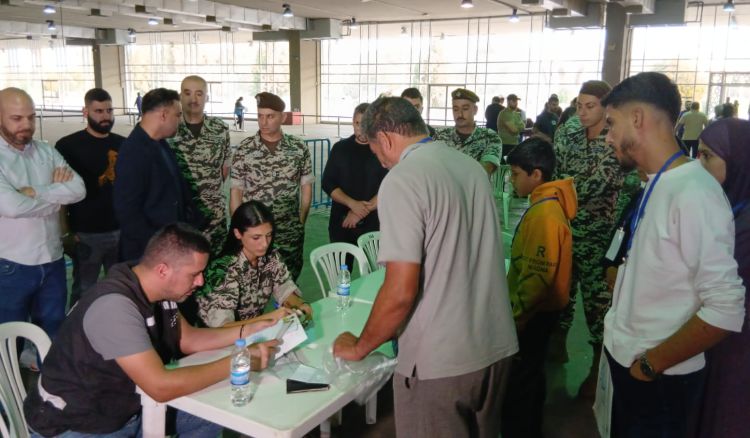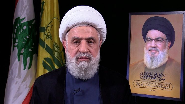
Lebanon launched the eighth wave of voluntary returns of displaced Syrians on Thursday morning, with 448 refugees departing from the Rachid Karami International Fair in Tripoli toward the Al-Abbudieh border crossing in Akkar. The returnees were transported in five groups aboard 14 buses and 14 trucks, as part of an organized repatriation program coordinated by Lebanese General Security, the UNHCR, and the International Organization for Migration (IOM).
Lebanese General Security officers supervised the entire operation, processing administrative procedures and facilitating the return journey. According to Lebanese authorities, the process aims to ensure safety, dignity, and proper documentation for all participants.
As organized returns continue, Lebanese officials are increasingly confronting the severe environmental damage left behind by years of large-scale displacement, particularly in areas like Arsal and along the Litani River.
Environmental Disaster
According to the Ministry of Environment, in a statement made during an on-site visit, “the damage is considerable, and pollution is very severe.”
The issue will soon be presented to the Council of Ministers to ensure that the bodies responsible for the displaced population fully integrate environmental considerations into their actions.
The ministry noted that the area is facing a critical situation characterized by a public health crisis, an accumulation of waste, and the presence of dumps where rubble and garbage are mixed. An intervention plan is deemed essential, particularly as Arsal remains a highly challenging case, with neither the municipality nor the state having sufficient resources to address the problem alone.
Demographic pressure has weighed heavily on the region, which has around 50,000 residents and, at the peak of the crisis, nearly 150,000 displaced Syrian persons. Around 140,000 of them have since left the area, but the traces of their presence remain visible. The ministry considers that the organizations involved in managing the camps must now contribute to environmental rehabilitation efforts.
Today, all that remains of the 180 former camps in Arsal are empty alleyways, scattered foundations, rubble, and uncollected waste, evidence of a years-long crisis that outpaced local infrastructure and environmental safeguards.
Litani River: A Long-Running Battle Against Pollution
Further south, the National Authority for the Litani River continues its campaign to dismantle informal Syrian refugee camps built along the riverbanks. Supported by security forces, the Authority has been clearing encroachments for years, most recently in the Sarafand area.
In an interview with This is Beirut, member of the Environmental Committee MP Ghayath Yazbek said that “there has been a major gap since the government’s decision a few years ago to allocate $800 million to clean the Litani River. Then the war happened, the money disappeared, and we no longer know what became of the cleanup plan.”
Yazbek stressed that this issue falls under the responsibility of the executive authority, noting that “any legislation required from our side, we are ready to support.” He also added that the political situation in Lebanon and the ongoing escalations in the south have prevented the committee from convening in the Cabinet.
Dr. Sami Alawieh, Director General of the Litani Authority, said the efforts are essential due to the severe risks these camps pose to river ecosystems.
Since 2018, the Authority has conducted field surveys revealing multiple sources of pollution, including unregulated camp settlements on public land.
According to Alawieh, “these camps caused direct pollution of the water and soil due to the absence of proper infrastructure, the use of non-compliant septic pits, and the discharge of wastewater and household and agricultural waste into the river.”
The scale of pollution affecting Lebanon’s largest freshwater basin is staggering:
- 50 million cubic meters of domestic wastewater flow into Lake Qaraoun every year.
- 2 million cubic meters of industrial wastewater are added to this burden.
- Waste from nearby refugee camps further aggravates contamination levels.
Only 20% of Lebanon’s available water resources are properly utilized, while the rest is lost, often due to pollution and mismanagement. Despite some improvements following World Bank intervention and the establishment of the National Water Regulatory Authority, experts warn that without major reforms, future generations will pay the price.
Regulatory Vacuum: No Official Syrian Camps in Lebanon
Despite the proliferation of camps over the past decade, Lebanon has no official Syrian refugee camps, according to UNHCR spokesperson Lisa Abou Khaled. Instead, informal settlements were established through private agreements between refugees and landowners, with refugees typically paying rent for the land on which tents were erected.
Because no ministry has released a comprehensive inventory, the exact number of camps remains unknown.
The Litani Authority alone has dismantled 34 sites, initiating legal action against landlords and beneficiaries who illegally exploited public river property. In the Bekaa, several informal settlements have also been cleared after becoming hubs for illegal activity.
Despite the complexities, the latest group of returnees expressed satisfaction with the organization and cooperation between Lebanese authorities and international agencies.
So far, more than 320,000 Syrians have returned after being removed from UNHCR registries, while over 110,000 others have formally expressed their intention to go back, bringing the expected total to nearly half a million returnees by the end of the year.
Authorities say the program, which has been in place since July 1, complements the growing rate of spontaneous returns and is accompanied by labor-market regulation measures for Syrians remaining in Lebanon. Support for returnees includes logistical and legal assistance, exemptions from fines and fees, and financial incentives of $100 per person in Lebanon and $400 per family upon arrival in Syria, in coordination with Syrian authorities.
As Lebanon navigates the intertwined challenges of displacement, environmental damage, and resource management, officials insist that coordinated returns, legal accountability, and environmental rehabilitation must move forward in parallel, before the consequences become irreversible.




Comments